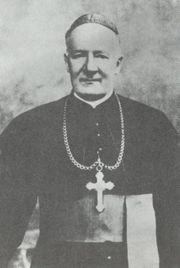Why Catholics Rightfully Honor the Saints
A saint is a person that lived a life of virtue, holiness, and union with God on earth. The Church recognizes a person’s sanctity by “canonizing” them. This means they are declared to be in Heaven and the Church presents the individual as one we are called to imitate. The Church does not canonize every soul in Heaven (even if known) but only those who the faithful are called to imitate and implore for aid.
The term "saint" is from the Latin word sanctus meaning "hallowed or “consecrated." The first person honored individually as a saint was Stephen, the first martyr. For nearly four centuries, praying to St. Stephen was incredibly popular. Beginning at the end of the second century, there were special celebrations on anniversaries of the martyrs' deaths. These martyrs were witnesses of Christ. They gave their lives for Him.
By the fourth century, sainthood was not just considered for martyrs. It was also for confessors and virgins. Saints could be monks, nuns, bishops, or any of the lay faithful. The saints are not merely the ones who have been canonized.
Scriptural Proof that the Saints Can Hear our Prayers
"And when he had opened the book, the four living creatures and the four and twenty ancients fell down before the Lamb, having every one of them harps, and golden vials full of odours, which are the prayers of saints" (Apocalypse 5:8).
The Book of Revelation, written by St. John the Apostle, explicitly describes how the prayers of the saints are presented before God in Heaven. The saints are fully aware of what happens on earth because God, in His divine order, allows them to hear the prayers addressed to them.
Scripture provides multiple examples of this awareness. In Matthew 17:3-5, the prophets Moses and Elijah appeared alongside Jesus at the Transfiguration, clearly conscious of earthly events. Hebrews 12:1 reinforces this idea, stating: "Therefore, since we are surrounded by so great a cloud of witnesses, let us rid ourselves of every burden and sin that clings to us and persevere in running the race that lies before us." Additionally, Christ Himself speaks in Luke 15:7-10 of those in Heaven rejoicing over the repentance of sinners on earth—something they could not do unless God permitted them to know what was happening.
God is the God of the living. As Jesus declares in Matthew 22:32: "I am the God of Abraham, and the God of Isaac, and the God of Jacob. He is not God of the dead, but of the living." Our souls do not cease to exist or enter a state of "sleep" after death. Instead, we are judged, and those who enter Heaven live forever in the joy of God’s presence. The appearance of Moses and Elijah at the Transfiguration confirms this—they were not mere visions but truly alive in God.
After detailing the faith of the ancient patriarchs in Hebrews 11, Scripture continues in Hebrews 12:1, emphasizing that we are "surrounded by such a great cloud of witnesses." What other interpretation could there be except that the saints are aware of us and intercede for us? The early Christians understood this well. St. Polycarp’s martyrdom account states: "We worship Christ as God's Son; we love the martyrs as the Lord's disciples and imitators... May we also be their companions and fellow disciples!" (Martyrium Polycarpi, 17). St. Dominic echoed this truth as he was dying, telling his brethren: "Do not weep, for I shall be more useful to you after my death, and I shall help you then more effectively than during my life."
Some argue that praying in the presence of statues of saints is idolatry, yet Scripture itself refutes this notion. In Exodus 25, God commands the Israelites to craft golden statues of angels. Similarly, in Numbers 21:8 and 1 Kings 6:18, sacred images are created under divine instruction. These images serve as reminders, just as one might keep a photograph of a loved one. However, we do not and must never pray to a statue—our prayers are directed to God and His saints, who are alive in Him.














